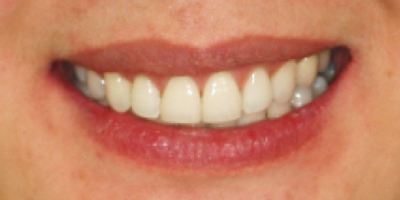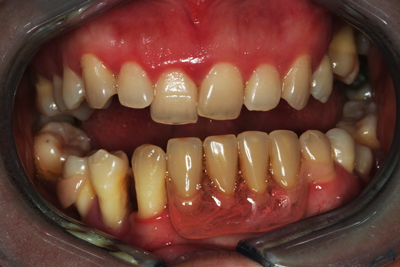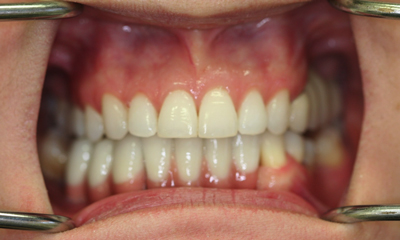Periodontics (Gum Disease Treatment) in Melbourne at our Essendon dental surgery
To make sure your teeth have solid foundations, taking care of gums (and knowing the signs for when they’re not healthy) is very important.
Periodontics is the branch of dentistry that deals with the prevention, diagnosis, and treatment of periodontal disease, also known as gum disease. It involves the care and maintenance of the structures that support the teeth, including the gums, bones, and ligaments.
Periodontists are specialised dentists who receive additional training and education in treating periodontal disease.
Our Essendon dental clinic in northern Melbourne has several dentists with extensive expertise in periodontics and gum disease treatment and prevention. They regularly attend additional training like the Periodontal Advanced Training Seminar in Sydney, where they learn the latest and most advanced techniques in gum surgery.

What causes gum disease?
Gum disease (periodontal disease) is caused by plaque – a sticky, colourless film of bacteria that is constantly forming on your teeth. These bacteria produce toxins that can cause sore & bleeding gums and tooth damage.
You know that brushing your teeth every day can help you avoid cavities. But avoiding cavities alone is not enough to keep your teeth healthy. You may be surprised to learn that most tooth loss in adults is not caused by tooth decay, but by gum disease. Our dentists look after your gums as well as your teeth, so we are the sensible choice for a periodontist in Essendon.
Gums cover and protect the bone that supports your teeth. This bone is like a foundation that supports a building – if the foundation becomes weakened, the building may fall down, even though there’s nothing wrong with the building itself. Similarly, if the gums are not cared for, the bone underneath can become infected and damaged. You can lose your teeth if the bone is not strong enough to hold your teeth in place – even if you’ve never had a cavity in your life!
Signs of gum disease
- Your gums are tender, swollen, or red.
- Your gums bleed when you brush or floss.
- You can’t get rid of bad breath or a bad taste in your mouth.
- There is pus from your gum line or between your teeth.
- Your teeth are loose or separating.
- Your teeth or dentures no longer fit together correctly.
Am I at risk for gum disease?
Yes, gum disease can affect you at any age; however, it most often affects adults. In fact, about three out of four adults over age 35 have gum disease now or have had it in the past.
Your risk of getting gum disease may increase if you smoke or have certain medical conditions. It is therefore vital to keep your dentist informed of your general health.
What is Gingivitis?
Gingivitis is an early form of gum disease characterised by inflammation of the gums. It develops when plaque collects above and below the gum line. Many of us will experience gingivitis at some time in our lives. (Nearly 75% of people over age 35 now have gum disease or have experienced it previously.) Fortunately, with immediate proper care, this type of gum disease is completely reversible.
Gingivitis is caused by infrequent or incorrect brushing and flossing which results in plaque build up on tooth surfaces, between teeth and under the gum line. Symptoms occur when bacteria in the plaque produce toxins that irritate gum tissue, causing gum tenderness, inflammation and pain.
If the disease is allowed to progress, gum infection will occur, accompanied by a tendency to bleed during brushing. In cases of acute gingivitis, more severe symptoms occur.
What is Periodontitis?
Periodontitis is a disease that occurs when bacterial toxins penetrate the gingiva and cause inflammation of the gums, ligaments and the bone structure, which support teeth. Although the effects of this inflammation may be irreversible, the disease’s progress can be halted and controlled.
Because periodontitis may occur without visible symptoms, it is important for your dentist or hygienist to examine regularly for increased gum pocket depths, one of the earliest signs of the disease.
Early Periodontitis
Early periodontitis may be associated with tooth sensitivity and a throbbing or tightness may be felt in the gum tissue. Periodontal disease can, however progress slowly without any visible signs or symptoms.

Moderate Periodontitis
Moderate periodontitis may cause loosening of the teeth, and an intensification and increased incidence of early periodontal symptoms.

Advanced Periodontitis
Advanced periodontitis is associated with gum recession, root decay, pus between teeth and gums, and loosening or loss of teeth.

Prevention of gingivitis and periodontitis
- Brush thoroughly at least twice a day, preferably in the morning and before bed. Use a soft-bristled toothbrush or a good quality power toothbrush – look for modern designs that are safe and gentle to use.
- Take your time. You should spend at least two minutes brushing to remove the plaque that is constantly forming on your teeth.
- Use toothpaste that contains fluoride. Fluoride is proven to help prevent cavities.
- Clean between teeth daily. Use floss or other interdental cleaners to remove plaque from areas that your toothbrush can’t reach. Did you know that if you don’t floss, you’re leaving up to 40% of your tooth surfaces untouched and uncleaned?
- See your dentist regularly to remove tartar build-up and check for signs of gum disease.
FAQs About Periodontics
How how do you treat periodontitis?
The treatment of periodontitis typically involves a deep cleaning procedure called scaling and root planing. This involves removing the buildup of plaque and tartar from the teeth and below the gumline. In some cases, antibiotics may also be prescribed to help fight infection.
Surgery may be required for advanced cases to repair or regenerate the damaged tissues. Treatment success depends on early detection and intervention, as well as regular follow-up care and maintenance.
How do you get rid of periodontal disease?
Periodontal disease, also known as gum disease, is a chronic condition that cannot be completely cured, but it can be effectively managed and controlled.
The key to managing periodontal disease is a combination of professional dental treatment and good at-home oral hygiene practices. These include regular dental cleanings and check-ups, daily brushing and flossing, and using an antibacterial mouthwash as recommended by your dentist.
By following these steps and making some lifestyle changes, such as avoiding smoking and maintaining a healthy diet, you can take control of your oral health and prevent further damage to your gums and teeth.
What causes periodontitis?
Periodontitis, also known as gum disease, is caused by a buildup of plaque on the teeth and gums. Plaque is a sticky film of bacteria that forms on the teeth and can harden over time, forming tartar.
When plaque and tartar are not removed through regular brushing and flossing, they can irritate and inflame the gums, leading to gingivitis, the earliest stage of gum disease.
If left untreated, gingivitis can progress to periodontitis, where the gums and bone around the teeth become damaged and infected. Other factors that can contribute to periodontitis include smoking, poor oral hygiene, genetics, hormonal changes, and certain medications.
Periodontics Case Study
Before & After: Orthodontics with Invisalign
This Essendon patient visited us with very loose teeth. The patient was concerned about further damage and potential loss of teeth.




Problem
The patient had loose and diseased teeth, with poor gum and jawbone health.
Gum alignment was inconsistent and her upper teeth required orthodontics.
The poor oral health also resulted in inconsistent teeth colour.
Treatment
Our comprehensive treatment plan included periodontics, dental implants, porcelain crowns and teeth whitening.
We began by extracting several teeth which were too diseased, followed by 6 months of regular visits to our hygienists to improve gum and bone health.
We then applied orthodontics to the upper row of teeth and performed a cosmetic gingevectomy using laser treatment at this time for even gum heights.
Once all remaining teeth were healthy and in the right alignment, we affixed dental implants to replace upper and lower missing teeth.
We finalised this case with a tooth-whitening treatment and affixed permanent crowns to the implants to match the revitalised teeth.
Treatment Time
2.5 years
Arrange an appointment right now
Start the process of achieving a better smile today by arranging an appointment. Just call us or if out of hours use our simple request a callback from and we will call you back when we are open.
Call 9379 1893
"*" indicates required fields